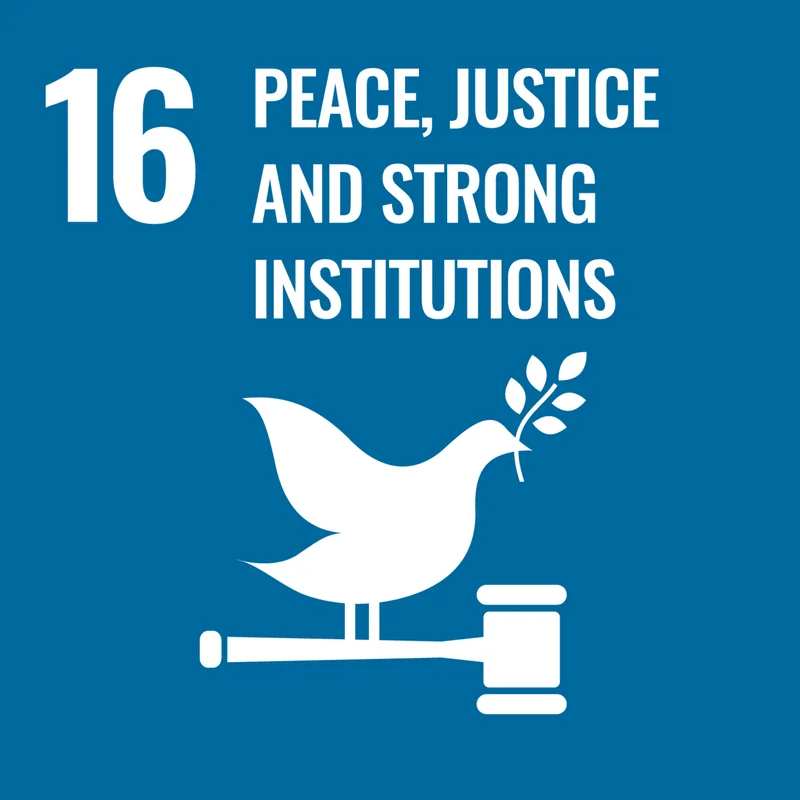SDG 16
Strong institutions for a just and inclusive society
The UN's Sustainable Development Goal 16 aims to promote peaceful, inclusive, and just societies, underpinned by effective and accountable institutions. However, by acting to defend its interests, the tobacco industry jeopardises the achievement of these objectives. It regularly intervenes in the decision-making process of the countries where it grows tobacco and sells cigarettes, deploying lobbyists, funding politicians' campaigns, and providing "ready-made" legislation.
In 2018 alone, tobacco companies and their affiliated organisations spent €4 million on lobbying costs with the European Commission. In comparison, actors campaigning for stricter smoking controls spent €25,000 to €50,000 during the same period.[1] In Switzerland, during the campaign for the popular initiative Children Without Tobacco, approved by the people on 13 February 2022, opponents received at least CHF 6 to 7 million from the tobacco industry, according to an AT Switzerland estimate, while the committee in favour of the initiative spent only CHF 1.2 million.

In Brazil, tobacco companies intervened to prevent the adoption of a law banning additives in tobacco products. It took two years for the legislation to finally pass in 2012.[2] Similarly, in Australia the industry delayed the implementation of addiction prevention messages.[3]
Their efforts focus on low-income countries where institutions are weaker. In Kenya, the passage of tobacco control legislation in 2007 took 13 years. In Namibia, it took until 2010 for a similar law, under discussion since the early 1990s, to be introduced. In both cases, these delays were due to interference from the tobacco industry.[4]
The arguments brandished by the tobacco giants evoke losses in terms of tax revenues, jobs that could disappear, and the impact on small shops selling cigarettes. In Uganda, British American Tobacco (BAT) claimed that a tobacco control law passed in 2015 would decimate the agricultural sector, threatening the survival of 14,000 farmers. To press its point, the firm canceled the contracts it had signed with 709 farms located in the electoral district of the law’s author. [5]
Even when legislation has come into force, the tobacco industry continues to work to undermine its implementation. In Kenya, it convinced authorities to place cigarette pack health warnings on easy-to-remove stickers. In Nigeria, it intervened to limit the definition of public space when smoking was banned there.[6]
When these attempts at covert influence fail, tobacco companies turn to the courts. Thailand, Sri Lanka, Nepal, Paraguay, the Philippines, Uganda, Kenya, Mexico, Argentina, Brazil, South Africa, Colombia, and Panama have all been sued by a tobacco industry representative when they tried to introduce health warnings on their cigarette packs, limit the advertising of tobacco products, or ban smoking in public places.[7]
While these tactics occupy a gray area, they are nonetheless legal. However, this has not always been the case. BAT found itself under investigation by the UK's Serious Fraud Office between 2017 and 2021, accused of paying bribes to politicians in Burundi, Comoros, Kenya, and Rwanda.[8]
The influence of tobacco companies is also felt in the international arena where they try to influence the standards and treaties that could impact their activities. The World Health Organization – and more generally the ecosystem that makes up International Geneva – have emerged as a prime target for them.
To remain incognito, they prefer to go through organisations that, under the guise of charitable activities, have as their main goal to defend the interests of the tobacco industry and are largely financed by them. These include Foundation for a Smoke-Free World, founded by Philip Morris International in 2017 with funding of USD 1 billion over 12 years[9]; the ECLT Foundation (an NGO – Eliminating Child Labour in Tobacco Growing), created in 2000 by representatives of the tobacco industry; and INNCO (the non-profit International Network of Nicotine Consumer Organisations), which brings together several organisations for the defense of electronic cigarettes.
All three have their headquarters in Geneva and regularly try to intervene in the debates within the international bodies based in the city at the end of the lake. INNCO thus managed to infiltrate the conference of the parties to the WHO Framework Convention on Tobacco Control in 2018, obtaining observer status there.[10] The ECLT has secured a consultancy position with the United Nations Economic and Social Council, has established partnerships with the International Labour Organization, and holds a seat on the child labour platform of the UN Global Compact.[11]
Starting in the 1990s, cigarette companies also began challenging the policies of some states to regulate smoking at the World Trade Organization, arguing through allied countries that they violate intellectual property rules. In 2012 and 2013, Ukraine, Honduras, Dominican Republic, Cuba, and Indonesia filed a complaint against Australia's decision to introduce logo-free cigarette packs.[12]
Countries and international organisations have a powerful tool to counter the influence of tobacco companies on their institutions in the form of Article 5.3 of the WHO Framework Convention on Tobacco Control, which Switzerland still has not ratified. This prohibits the tobacco industry from interfering in public policies relating to health or smoking. By 2014, two-thirds of the 130 States party to the Framework Convention had implemented measures to limit such interference.[13] Several countries, including Brazil, South Africa, Sri Lanka, and the United Kingdom, have also created programmes to monitor the activity of tobacco companies in their territories.[14] The counter-attack is getting organised.
[1] https://www.transparency.org/en/news/tobacco-smokescreen-deadly-consequences-of-undue-influence
[2] https://untobaccocontrol.org/taxation/e-library/wp-content/uploads/2019/07/Tobacco-Atlas-2018.pdf
[4] Gilmore AB, Fooks G, Drope J, Bialous SA, Jackson RR. Exposing and addressing tobacco industry conduct in low-income and middle-income countries. Lancet. 2015 Mar 14;385(9972):1029-43. doi: 10.1016/S0140-6736(15)60312-9
[5] Ibidem
[6] Ibidem
[7] Ibidem
[8] https://tobaccotactics.org/wiki/corruption/
[9] van der Eijk, Yvette; Bero, Lisa A.; Malone, Ruth E. (2019): Philip Morris International-funded 'Foundation for a Smoke-Free World': analysing its claims of independence. In Tobacco control 28 (6), pp. 712–718. DOI: 10.1136/tobaccocontrol-2018-054278
[11] https://tobaccotactics.org/wiki/eclt/
[12] Gilmore AB, Fooks G, Drope J, Bialous SA, Jackson RR. Exposing and addressing tobacco industry conduct in low-income and middle-income countries. Lancet. 2015 Mar 14;385(9972):1029-43. doi: 10.1016/S0140-6736(15)60312-9
[14] https://untobaccocontrol.org/taxation/e-library/wp-content/uploads/2019/07/Tobacco-Atlas-2018.pdf